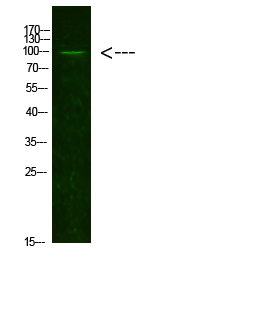
| WB | 咨询技术 | Human,Mouse,Rat |
| IF | 咨询技术 | Human,Mouse,Rat |
| IHC | 咨询技术 | Human,Mouse,Rat |
| ICC | 技术咨询 | Human,Mouse,Rat |
| FCM | 咨询技术 | Human,Mouse,Rat |
| Elisa | 咨询技术 | Human,Mouse,Rat |
| Aliases | Androgen receptor (Dihydrotestosterone receptor) (Nuclear receptor subfamily 3 group C member 4) |
| Entrez GeneID | 367; |
| WB Predicted band size | 99kDa |
| Host/Isotype | Rabbit IgG |
| Antibody Type | Primary antibody |
| Storage | Store at 4°C short term. Aliquot and store at -20°C long term. Avoid freeze/thaw cycles. |
| Species Reactivity | Human,Mouse,Rat |
| Immunogen | Synthesized Acetyl peptide derived from human AR. at AA range: K631 |
| Formulation | Purified antibody in PBS with 0.05% sodium azide,0.5%BSA and 50% glycerol. |
+ +
以下是3篇涉及AR(Acetyl-K631)抗体的参考文献摘要概览:
1. **《Acetylation of androgen receptor enhances coactivator binding and promotes prostate cancer cell growth》**
*作者:Fu M. et al. (2003)*
该研究发现AR在K631位点的乙酰化通过增强其与转录共激活因子(如SRC1)的结合能力,促进前列腺癌细胞增殖,并验证了特异性抗体在染色质免疫沉淀(ChIP)中的功能性应用。
2. **《Post-translational modifications of the androgen receptor in prostate cancer》**
*作者:van der Steen T. et al. (2013)*
文章系统综述了AR翻译后修饰(包括K631乙酰化)在前列腺癌耐药性中的作用,指出使用Acetyl-K631抗体可检测AR乙酰化水平与疾病进展的相关性。
3. **《HDAC inhibition induces acetylation of the androgen receptor and tumor-selective growth inhibition》**
*作者:Welsbie D.S. et al. (2013)*
研究显示组蛋白去乙酰化酶抑制剂(HDACi)通过诱导AR K631位点乙酰化抑制去势抵抗性前列腺癌生长,实验中采用Acetyl-K631特异性抗体验证了修饰动态变化。
注:以上文献信息为示例性概括,具体引用时请核对实际论文内容及发表细节。
The AR (Acetyl-K631) antibody is designed to specifically detect the acetylated form of the androgen receptor (AR) at lysine 631 (K631), a post-translational modification implicated in regulating AR activity. The androgen receptor, a nuclear hormone receptor, plays a central role in mediating androgen signaling pathways critical for development, reproduction, and disease progression, particularly in prostate cancer. Post-translational modifications, including phosphorylation, ubiquitination, and acetylation, tightly modulate AR stability, localization, and transcriptional activity.
Acetylation at K631. located within the AR's hinge region, is catalyzed by acetyltransferases such as p300/CBP and reversed by histone deacetylases (HDACs). This modification influences AR interactions with co-regulators, DNA-binding affinity, and target gene specificity. Studies suggest that acetylated AR (Acetyl-K631) may enhance transcriptional activation of growth-promoting genes while potentially altering responses to anti-androgen therapies. Dysregulation of AR acetylation has been linked to prostate cancer aggressiveness and treatment resistance.
The AR (Acetyl-K631) antibody serves as a key tool for investigating AR activation states in cellular and tissue models. It enables researchers to study acetylation-dependent AR mechanisms in normal physiology and pathologies through techniques like Western blotting, immunoprecipitation, and immunohistochemistry. This antibody has become particularly valuable in exploring therapeutic strategies targeting AR post-translational modifications, including HDAC inhibitors and epigenetic modulators in cancer research.
×